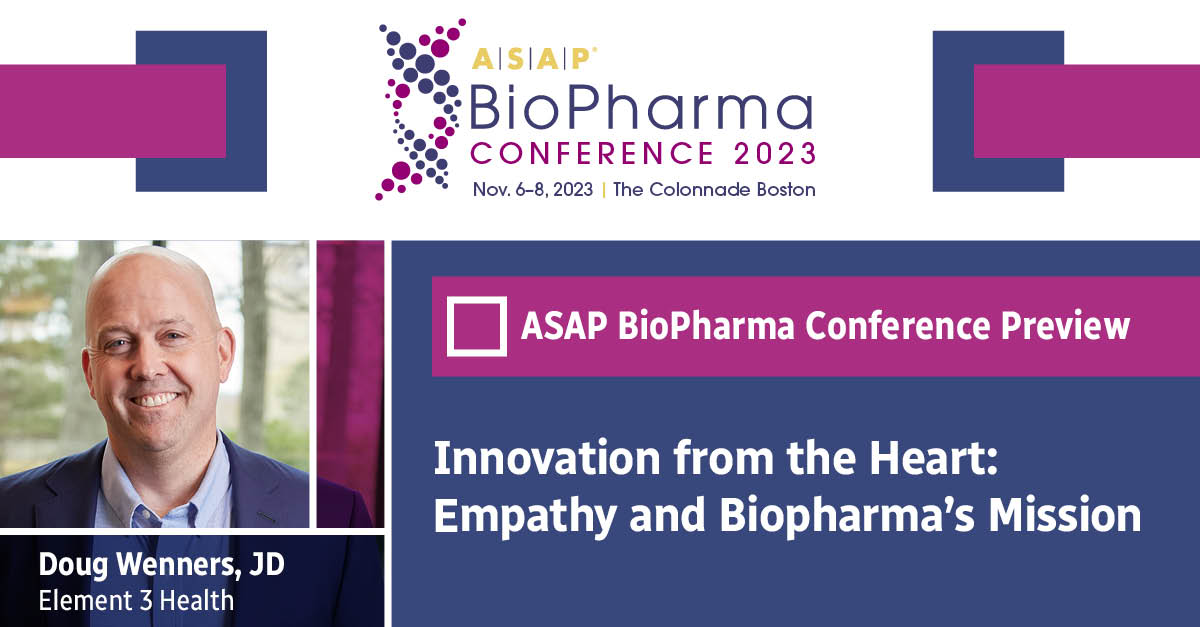Innovation from the Heart: Empathy and Biopharma’s Mission
Almost 30 years ago, Doug Wenners was close to earning his law degree and well on his way to a career as an attorney when he was suddenly jolted with life-changing—and potentially life-ending—news: he had been diagnosed with Hodgkin’s disease, a type of cancer that affects the lymphatic system. He beat cancer then, just as his father would years later, ultimately putting him on a much different path that wouldn’t include courtrooms, depositions, and summary judgments—and one that will see him at the 2023 ASAP BioPharma Conference in less than two weeks, where he will open the event with his keynote presentation, “Be the Change: How Great Leaders Bridge the Science-to-Patient-Care Gap.”
Today, Wenners is living a life of empathy, dedicating his time, spirit, and energy to pulling older adults out of social isolation—a condition that results in a 29 percent increased risk of heart disease, 32 percent increased risk of stroke, and a 50 percent increased risk of dementia, which recently spurred the U.S. Surgeon General to sound the alarm that it is a major health crisis—and providing the means for them to make meaningful connections through a variety of activities as CEO of activity benefits management company Element3 Health. This venture builds on a similar previous entrepreneurial endeavor Wenners spearheaded as the founder and CEO of Prospero Health, an organization that provided a variety of medical, emotional, and social support services for the families of cancer patients in the middle of arduous treatment regimens.
For Patients, the Little Things in Life Are Huge
The notion of empathy as a source of fuel for the fire propelling a career in biopharma certainly isn’t new to alliance managers in the industry. Companies talk the talk and mostly walk the walk about creating a “patient-focused culture,” and when Wenners espouses using the patient’s journey as a motivating force for doing the day job of alliance management, as he plans to do as part of his presentation, it won’t be a novel concept in and of itself. However, Wenners wants biopharma employees to take it a step further.
He will urge attendees to keep personal connections to people, family members, friends, and others in their lives fighting cancer, infectious diseases, and the other maladies for which they are developing drugs to treat and heal those that are close to their hearts as they go about their day-to-day alliance duties. Their focus should be broader than the pills, equipment, and treatments they are testing, manufacturing, and selling and the painful and disruptive symptoms those therapies will be eradicating. The inspiration should also come from the everyday activities, hobbies, and little things in life—shopping, playing pickleball, dining with family—that alliance managers at every phase of the drug development life cycle will enable by bringing drug candidates through the lab, securing regulatory approval, and getting them into the hands of physicians and patients.
“When those experiences inform your work, it becomes a powerful way to not just create blockbuster drugs but to create a company that does good,” said Wenners. “Empathy’s profound nature does wonders for a corporate culture; companies see less turnover and deeper engagement when employees are there for the mission, not a paycheck—they are part of something bigger than themselves.”
Leading from the Heart, Not the Ego
Wenners certainly is not alone, especially in ASAP circles, in thinking that empathy improves individual and company performance and morale. In his view, empathy is the beating heart of a collaborative environment. His leadership style is to encourage innovation from all comers—senior leaders, lower-level employees, partners, customers, etc.—and not to fight over who gets credit for it.
“If you lead from the heart, it doesn’t matter who had a good idea. Your ego is not driving advancements; passion for the group and the mission is,” said Wenners. “Democratic leadership demonstrated by an empathetic leader lends itself beautifully to a collaborative environment and drives real change.”
And when companies have the luxury to forgo a percentage of profits for the broader mission, they can feed glaring societal needs, such as those organizations currently tackling rare diseases.
“Be the Change: How Great Leaders Bridge the Science-to-Patient-Care Gap” will take place Tuesday, Nov. 7, at 8:45 at the Colonnade Hotel in Boston. Register now to hear more about Wenners’s journey and how it can impact yours.

